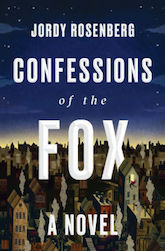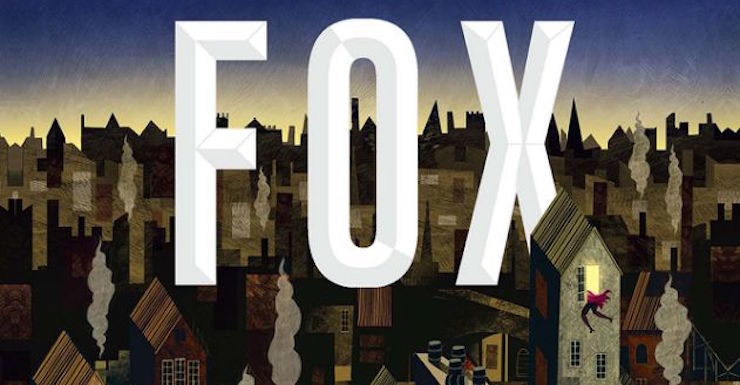“It is productive to think about utopia as flux, a temporal disorganization, as a moment when the here and the now is transcended by a then and a there that could be and indeed should be,” writes the late, much-missed queer theorist José Esteban Muñoz in his 2009 survival manual Cruising Utopia: The Then and There of Queer Futurity. Queer time, Muñoz suggests, is a strategy for demanding queer possibilities from straight retellings of the past in order to bridge the gap between the material conditions of the present and the longing for a radically utopian future. And if ever a novel has succeeded in explicitly making flesh the possibilities of queer futurity, Confessions of the Fox is that book.
At least on its surface, Jordy Rosenberg’s debut1 novel is an exuberantly polyphonic take on the life and times of the “real”-life English folk hero Jack Sheppard, a minor thief who became the eighteenth century’s most notorious rogue after he coolly liberated himself and his lover, a sex worker known as Edgeworth Bess, from The New Prison in Clerkenwell. Sheppard’s increasingly daring prison escapes, drunken mischief, refusal to get a real job, and ultimate untimely execution inspired a canon including writers from Bertolt Brecht to Neal Stephenson.
Buy the Book


Confessions of the Fox
Such stuff alone is sufficient framework for a splendid romp, but in Confessions of the Fox Rosenberg turns the conventional antihero’s journey on its head, quilting together a dazzling array of references from Patrick Chamoiseau2 to J.L. Austin to build a novel that is equal parts anticapitalist, anticolonial queer history and delicious, exuberantly sexy caper.3 Rosenberg’s Jack is indeed history’s, but this Jack holds a vastly expanded set of possibilities: In Fox, Sheppard is a trans, queer, unlikely hero whose chosen family of rogues embody a multiplicity of queer narratives, queer insurrections, and queer times. Bear with me; I’ll explain all that.4 But if this is as far as you prefer to read, I’ll tell you this much: This book will make you want to run out into the street, set a jail on fire, and make out with someone beautiful in the smoldering ruins of carceral capitalism, and that’s about all you really need to know.
Confessions of the Fox opens with a melancholy editor’s note from a Dr. R. Voth, a melancholy academic grieving a freshly-imploded relationship (we can tell, pretty quickly, that the breakup was almost certainly his fault5) and the new custodian of a mysterious manuscript that may or may not be the lost true history of one Jack Sheppard, rogue extraordinaire. We are already being led to understand that something different this way comes: “There was something very wrong with the manuscript,” Voth tells us as he recounts his transcription of the deteriorating pages he’s been entrusted with—by whom, exactly, it will take us the duration of the novel to learn. “And furthermore, I needed to disappear with it.”
But before we’re told what Voth’s own escape entails, we’re dropped pell-mell into the antic dispositions of Jack Sheppard himself. Voth’s manuscript opens with a lovingly detailed description of “quim-carousing”6 and barrels off from there, in a gleeful mashup of Daniel Defoe, Sarah Waters, and The Anarchist Cookbook. And Voth’s increasingly intrusive footnotes rapidly abandon all semblance of critical distance to tell a marvelous strange story of their own, one that dive-bombs its source material and comes out the other side like a threaded needle piecing together seemingly unrelated pieces of text into a kaleidoscopic whole. Jack’s family of rogues is insistently queer and of color, and this Jack’s Bess is a universe of her own, a Southeast Asian (“We have to take the unquestioned nature of Bess’s characterization of white as less a reflection of ‘actual’ history than as the occlusion of it,” Voth tells us when we first meet her, casually setting fire to centuries of canonical erasure) refugee and sex worker who is wiser, fiercer, and more worldly than the often-hapless Jack, and whose own ferocious narrative runs clear and strong throughout.
It’s no accident that nearly every page of Fox brings to mind Muñoz: Confessions of the Fox is a novelization of the resistant queer project of investing institutional histories with our own presence and desire, of Muñoz’s loving demand that we expand all times into queer times so that the possibility of a queer-utopian future is always present in the past, the way certain subatomic particles can exist in multiple states of being and time simultaneously.7 And by the final section of the novel, when we realize just what R. Voth’s manuscript is and where it came from, the book has long since embarked on a gleeful jailbreak of its own from the bounds of the expected. If a book can be a family, then Confessions of the Fox is a whole genealogy of love and survival extending infinitely into the past and every imaginable future.
Confessions of the Fox is a very good adventure story indeed: by turns riveting, hilarious, and wildly sexy, a book for which the adjective “rollicking” seems to have been invented. But it’s also a searing condemnation of the state’s ongoing intrusions into queer language and desire and the hell-world intersectionality of capitalism and policing—as present in Sheppard’s time as it is in our own. And as infused as it is with anger and grief and pain, it never gives way to despair, returning again and again to Voth’s—and Rosenberg’s—central thesis: The body is transformed by love—the queer body, the textual body, the historical body, the body of our story, and, in Jack’s case, the literal body itself.
On every page Confessions of the Fox is more than just a novel. It’s a fierce and joyful testament to the power of unsurrender, of community and refusal, a handbook for brokenhearted queers building resistance in the face of a seemingly limitless carceral state determined to imprison and deport and confine and commodify any bodies that do not meet its starkly bounded standards of personhood,8 all the way to its final, beautifully moving lines. “We will beat them,” Bess says to Jack at a critical juncture in their attempted overthrow of the forces determined to erase them. “I know,” Jack says. Maybe we will; maybe we won’t. But no matter how the present ends, Confessions of the Fox is a reminder that a better future has always been possible. It has been living inside of us all along.
Confessions of the Fox is available now from One World.
1: !!!! Really makes a person feel the need to up her game, I tell you what.
2: Have you not read Texaco? Go read Texaco right now.
3: If you grew up Catholic and are easily made bashful by Highly Erotic Passages I do not recommend reading this book on the train.
4: Well, sort of. Sorry.
5: God bless him.
6: Look it up, if you didn’t get that.
7: If quarks can be charming I don’t see why they can’t also be gay.
8: So, you know, somewhat relevant to our Current Political Moment.
Sarah McCarry is the author of three novels: All Our Pretty Songs, a Tiptree Award honoree; the Norton award-nominated Dirty Wings; and the Lambda award-nominated About A Girl.










